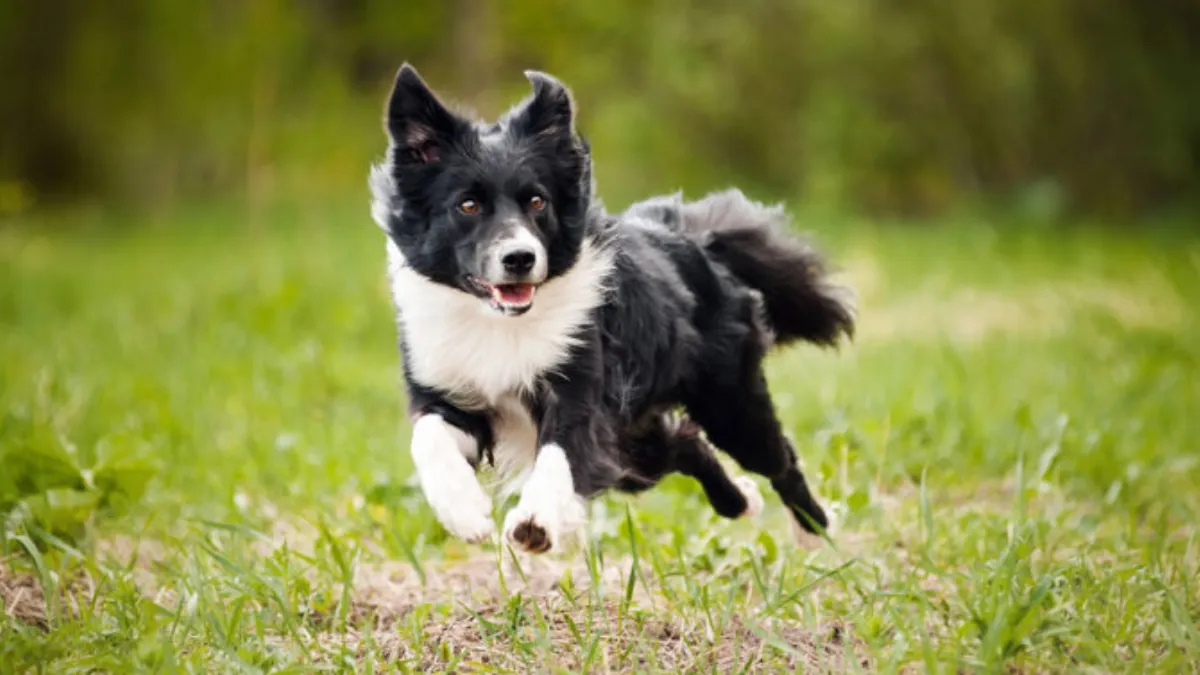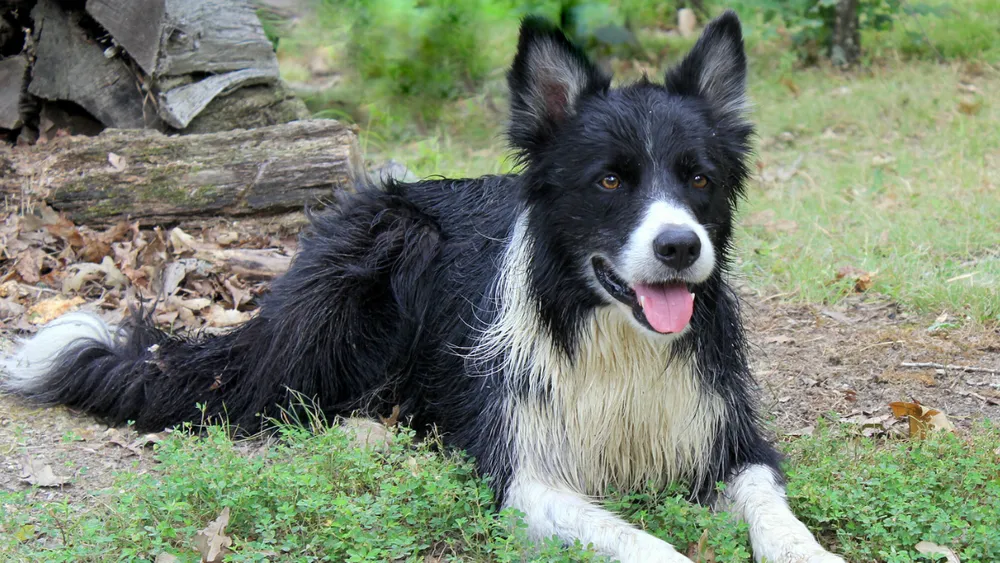Collies, renowned for their intelligence and loyalty, raise a common query: "Can Collies Be Left Alone?" This concern is valid, as extended solitude may trigger behavioral issues and distress in these affectionate dogs.
Border collies, a specific type of collie breed, are known for their high energy levels and need for mental and physical stimulation. As a result, they may not be well-suited for owners who work long hours or are frequently away from home. However, like all dogs, collies can be trained to adapt to their owner's schedule and lifestyle. With proper training and attention, collies can learn to be comfortable and content when left alone for reasonable amounts of time.

Overall, the answer to whether collies can be left alone depends on various factors, including the individual dog's temperament, training, and exercise needs, as well as the owner's lifestyle and schedule. In the following sections, we will explore these factors in more detail to provide a comprehensive answer to this common question.
Understanding Collies
Breed Characteristics
Collies are a type of herding dog that originated in Scotland. They are known for their intelligence, loyalty, and gentle nature. Collies come in two varieties: the rough-coated Collie and the smooth-coated Collie. The rough-coated Collie has a long, thick coat that requires regular grooming, while the smooth-coated Collie has a shorter, more manageable coat.
Collies are medium-sized dogs, with males typically weighing between 60-75 pounds and females weighing between 50-65 pounds. They have a distinctive wedge-shaped heads and pointed ears that stand erect. Collies are also known for their expressive eyes, which are typically brown.
Intelligence and Energy Levels
Collies are highly intelligent dogs and are known for their ability to learn quickly. They are often used as working dogs, particularly in herding and search and rescue roles. Collies are also popular as family pets due to their gentle nature and loyalty.

Collies have a moderate energy level and require daily exercise to stay healthy and happy. They enjoy going for walks and playing outdoors but also enjoy spending time indoors with their families. Collies are not typically hyperactive, but they do require mental stimulation to prevent boredom.
Herding Instincts
Collies are natural herders and have a strong instinct to herd other animals. This can sometimes manifest as nipping or chasing behavior, particularly with children or other pets. It is important to train collies early on to prevent these behaviors from becoming problematic.
Collies can also be trained to compete in herding trials, where they are judged on their ability to herd sheep or other livestock. This type of training can be a great way to provide mental stimulation and exercise for collies.
Overall, collies are intelligent, loyal dogs that make great family pets. They require daily exercise and mental stimulation to stay healthy and happy, and their herding instincts should be managed through early training.
Collies and Separation Anxiety
Collies are known for their loyalty and attachment to their owners. However, this strong bond can also lead to separation anxiety when left alone. Separation anxiety is a condition where dogs become anxious and stressed when separated from their owners or when left alone for an extended period.
Signs of Anxiety
Collies suffering from separation anxiety may exhibit several signs of anxiety, such as whining, pacing, and destructive behavior. They may also bark excessively, drool, and try to escape from their confinement. In severe cases, they may even harm themselves by chewing on their paws or tail.
Managing Anxiety in Collies
Managing separation anxiety in collies can be challenging, but several strategies can help. First, it is essential to start training collies from a young age to get used to being alone gradually. This can be done by leaving them alone for short periods and gradually increasing the duration.

Another strategy is to provide collies with plenty of exercise and mental stimulation. This can help reduce their anxiety levels and keep them occupied while their owners are away. Providing them with interactive toys and puzzles can also be helpful.
In some cases, medication may be necessary to manage separation anxiety in collies. Anti-anxiety medications can help reduce their anxiety levels and make them feel more relaxed when left alone. However, it is essential to consult with a veterinarian before giving any medication to ensure that it is safe and effective for the individual collie.
Overall, separation anxiety can be a significant issue for collies and their owners. However, with proper training, exercise, and mental stimulation, it is possible to manage their anxiety levels and help them feel more comfortable when left alone.
Training for Independence
Collies are known for their loyalty and attachment to their owners. However, it is important to train them to be independent and comfortable with being left alone for periods. This can prevent separation anxiety and destructive behavior.
Crate Training Basics
Crate training is a useful tool for teaching collies to be comfortable with being alone. Start by introducing the crate as a positive space, using treats and positive reinforcement to encourage your collie to enter it. Gradually increase the amount of time your collie spends in the crate, starting with just a few minutes and gradually working up to longer periods.
Make sure the crate is appropriately sized for your collie, with enough room for them to stand up, turn around, and lie down comfortably. Avoid using the crate as punishment, and always provide your collie with plenty of exercise and attention outside of the crate.

Routine Establishment
Establishing a routine can also help your collie feel more comfortable with being left alone. Set a regular schedule for feeding, exercise, and playtime, and stick to it as closely as possible. This can help your collie feel more secure and calm, and can also make it easier to predict when they may need to go outside or take a nap.
Obedience and Commands
Teaching your colleagues basic obedience commands can also help them feel more independent and confident. Start with simple commands like "sit" and "stay," and gradually work up to more advanced commands like "come" and "heel." Consistency is key when training collies, so make sure to use the same commands and reward system every time.
Overall, training collies for independence requires patience, consistency, and positive reinforcement. With the right training and routine, collies can learn to be comfortable and calm when left alone.
Stimulation and Entertainment
Collies are intelligent and active dogs that require plenty of stimulation and entertainment to keep them from becoming bored and destructive when left alone. Providing your collie with physical exercise, mental stimulation, and interactive toys can help keep them happy and healthy while you're away.
Physical Exercise
Collies are high-energy dogs that need plenty of exercise to stay healthy and happy. A lack of physical activity can lead to boredom and destructive behavior. It's important to provide your collie with regular opportunities for exercise, such as daily walks or runs, trips to the dog park, or playtime in a large, fenced yard.
Mental Stimulation
In addition to physical exercise, collies also need mental stimulation to keep them from becoming bored. Mental stimulation can come in the form of training sessions, puzzle toys, and interactive games. Teaching your collie new tricks or commands can provide mental stimulation and help build a stronger bond between you and your dog.
Interactive and Puzzle Toys
Interactive and puzzle toys can provide hours of entertainment for your collie when you're not around. These toys can help keep your collie's mind engaged and prevent boredom. Some popular interactive and puzzle toys for collies include treat-dispensing toys, puzzle feeders, and interactive games that require your collie to solve a problem or complete a task.
In conclusion, providing your collie with plenty of physical exercise, mental stimulation, and interactive toys can help keep them happy and healthy when left alone. By understanding your collie's needs and providing them with the right stimulation and entertainment, you can help prevent boredom and destructive behavior.
Creating a Safe Environment
When leaving a Border Collie alone at home, it is important to create a safe environment to ensure their well-being and prevent any accidents. This can be achieved by following a few simple steps.
The Importance of a Safe Space
Firstly, it is important to create a safe space for the Border Collie to relax in. This can be achieved by using a crate or den, which provides a secure and comfortable environment for the dog to rest in. It is important to ensure that the crate or den is the appropriate size for the dog, as a space that is too small can cause discomfort and stress.
Leaving Comfort Items
Leaving comfort items such as a favorite toy or blanket can also help to create a safe and familiar environment for the Border Collie. This can help to reduce any anxiety or stress that the dog may experience when left alone.
Setting Up for Safety
In addition to providing a safe space and comfort items, it is important to set up the home environment for safety. This can include removing any hazardous items such as sharp objects or toxic substances, and ensuring that any electrical cords or wires are out of reach.
Overall, creating a safe environment for a Border Collie when left alone is crucial for their well-being and safety. By following these simple steps, owners can ensure that their dog is comfortable and secure while home alone.
Dealing with Boredom and Destructive Behavior

Recognizing Boredom
Border Collies are intelligent and active dogs that require a lot of mental and physical stimulation. When they don't receive enough attention or exercise, they can become bored and develop destructive behaviors. Signs of boredom in Border Collies include excessive barking, chewing, digging, and other unwanted behaviors.
Preventing Destructive Behavior
To prevent destructive behavior, it's important to keep Border Collies entertained and engaged. Providing them with a variety of toys and puzzles can help keep their minds active and prevent boredom. Regular exercise, such as long walks or runs, can also help reduce destructive behavior.
Owners should also ensure that their Border Collies have a safe and secure environment. Providing a designated area for them to play and keeping valuable items out of reach can help prevent destructive chewing or digging.
In some cases, professional training or behavioral therapy may be necessary to address destructive behavior. Owners should consult with a veterinarian or professional dog trainer if they are experiencing issues with their Border Collie's behavior.
Overall, with proper attention and care, Border Collies can be left alone for short periods without developing destructive behavior. However, it's important to recognize the signs of boredom and take steps to prevent unwanted behavior.
Social Needs and Companionship
The Role of a Canine Companion
Collies are social animals that thrive on companionship. They are pack animals and require social interaction to maintain their mental and emotional well-being. Leaving a collie alone for extended periods can lead to boredom, anxiety, and destructive behavior. Therefore, it is important to provide them with a canine companion or human interaction to keep them company.
If you are considering getting a collie, it is important to understand that they are not solitary animals and require regular social interaction. If you are unable to provide them with the necessary companionship, it may be best to consider a different breed.
Human Interaction and Family
Collies are known for their loyalty and affection towards their family members. They thrive on human interaction and enjoy spending time with their owners. Leaving a collie alone for extended periods can lead to feelings of isolation and loneliness.
If you are unable to provide your collie with a canine companion, it is important to ensure that they receive plenty of human interaction. Spending time with your collie, playing games, and going for walks can help to keep them mentally and emotionally stimulated.
In conclusion, collies are social animals that require companionship and interaction to maintain their well-being. Whether it be through a canine companion or human interaction, it is important to provide them with the necessary social interaction to keep them happy and healthy.
Professional Care Options
Leaving a Border Collie alone for long periods can lead to boredom and destructive behavior. Professional care options can help ensure that your dog gets the attention and exercise they need while you are away.

Hiring a Dog Walker or Sitter
Hiring a dog walker or sitter can be a great option for busy owners who are away from home for extended periods. A dog walker can provide your Border Collie with daily exercise and mental stimulation, while a sitter can offer companionship and care in your absence.
When hiring a dog walker or sitter, it is important to find someone who is experienced with Border Collies and understands their unique needs. Look for someone reliable, trustworthy, and has positive reviews from other clients. You can also ask for references and conduct background checks to ensure that your dog is in good hands.
Considering Doggy Daycare
Doggy daycare can be a good option for Border Collies who need socialization and exercise during the day. Daycare facilities typically offer playtime, training, and rest periods throughout the day, which can help keep your dog happy and healthy.
When considering a daycare facility, it is important to visit the facility beforehand and ask about its policies and procedures. Look for a facility that has experienced staff, a clean and safe environment, and positive reviews from other clients. You can also ask for references and conduct background checks to ensure that your dog is in good hands.
Overall, professional care options can be a great way to ensure that your Border Collie gets the attention and exercise they need while you are away. Whether you choose a dog walker, sitter, or daycare facility, make sure to do your research and find a professional who is experienced with Border Collies and can provide the care your dog needs.
Health Considerations
Nutrition and Hydration
Proper nutrition and hydration are essential for the overall health and well-being of a Border Collie. It is important to provide them with a balanced diet that includes all the necessary nutrients, vitamins, and minerals. A diet that is high in protein and low in fat is ideal for this breed. Border Collies also need access to clean and fresh water at all times to prevent dehydration.
It is recommended to feed your Border Collie twice a day, with the amount of food depending on their age, weight, and activity level. Treats should be given in moderation and should not make up more than 10% of their daily calorie intake.
Regular Veterinary Check-ups
Regular veterinary check-ups are crucial in ensuring the health and well-being of a Border Collie. These check-ups should be scheduled at least once a year, but more frequent visits may be necessary for senior dogs or those with pre-existing health conditions.
During these check-ups, the veterinarian will perform a physical examination, check for any signs of illness or disease, and administer any necessary vaccinations or preventative treatments. It is important to keep up with these check-ups to catch any potential health issues early on and ensure that your Border Collie stays healthy and happy.
In conclusion, proper nutrition, hydration, and regular veterinary check-ups are essential for the overall health and well-being of a Border Collie. By providing them with the necessary care and attention, you can help ensure that your furry friend lives a long and healthy life.
Age-Related Considerations

Puppies vs Adult Collies
When it comes to leaving collies alone, age is an important factor to consider. Puppies, for example, require much more attention and care than adult collies. They have a lot of energy and need to be trained, socialized, and given plenty of exercise. Puppies should not be left alone for long periods, as they may become anxious, destructive, or develop separation anxiety.
Adult collies, on the other hand, are generally more independent and can handle being left alone for longer periods. However, it is still important to provide them with enough exercise, mental stimulation, and socialization to keep them happy and healthy. Adult collies may also need some training or reinforcement of good behavior if they are not used to being left alone.
Senior Collies and Their Needs
Senior collies have different needs than puppies and adult collies. They may require more rest and may not have as much energy as they used to. It is important to provide them with a comfortable and safe space to rest, as well as access to food, water, and any medication they may need.
Senior collies may also need more frequent potty breaks and may not be able to hold their bladder for as long as they used to. It is important to take them outside regularly and provide them with easy access to a potty area.
Overall, when leaving collies alone, it is important to consider their age and individual needs. Puppies, adult collies, and senior collies all have different requirements, and it is important to provide them with the appropriate care and attention to keep them healthy and happy.
Leaving Collies Alone Responsibly
Determining Appropriate Durations
Collies are social animals and enjoy spending time with their owners. However, there may be times when they need to be left alone. It is important to determine the appropriate duration for leaving a collie alone.
The length of time a collie can be left alone depends on various factors, such as age, temperament, and activity level. Generally, adult collies can be left alone for up to eight hours a day, while puppies and senior dogs should not be left alone for more than four hours.
It is important to note that leaving a collie alone for extended periods can lead to separation anxiety, which can result in destructive behavior. Therefore, it is important to gradually increase the amount of time a collie is left alone and provide them with plenty of mental and physical stimulation.

Ensuring Comfort and Security
When leaving a collie alone, it is important to ensure their comfort and security. This can be achieved by providing them with a comfortable and safe environment, such as a crate or a designated area in the home.
It is also important to provide them with access to water and toys to keep them occupied. Additionally, leaving a radio or television on can provide them with some comfort and help mask outside noises.
Before leaving a collie alone, it is important to take them for a walk or provide them with some form of exercise to help them relax. It is also important to give them attention and affection when returning home to reinforce positive behavior.
In summary, collies can be left alone for appropriate durations with proper preparation and care. It is important to determine the appropriate duration and provide them with a comfortable and secure environment to prevent separation anxiety and destructive behavior.
Conclusion:
In conclusion, the question "Can Collies Be Left Alone?" remains a significant concern for many prospective dog owners. Collies, known for their loyalty and affectionate nature, typically thrive on human companionship and may experience separation anxiety if left alone for extended periods. However, with proper training, socialization, and gradual desensitization, Collies can learn to tolerate being alone for reasonable durations.
Responsible Collie ownership entails understanding and addressing their need for companionship, mental stimulation, and physical exercise. Providing interactive toys, regular walks, and engaging activities can help alleviate boredom and prevent destructive behaviors when left alone.
While some Collies may adapt better to solitude than others, owners need to assess their individual dog's temperament and needs. Additionally, seeking guidance from a professional dog trainer or behaviorist can offer valuable insights and strategies for managing separation anxiety.
Ultimately, while Collies can be left alone for short periods with appropriate preparation and training, prolonged isolation should be avoided to ensure their well-being and happiness. Can Collies Be Left Alone? This question underscores the importance of understanding and addressing the needs of this beloved canine breed.